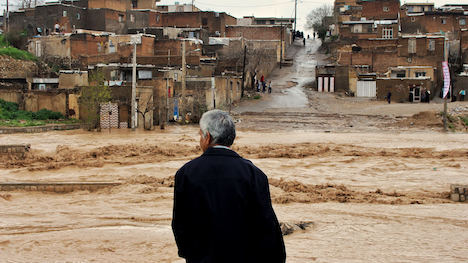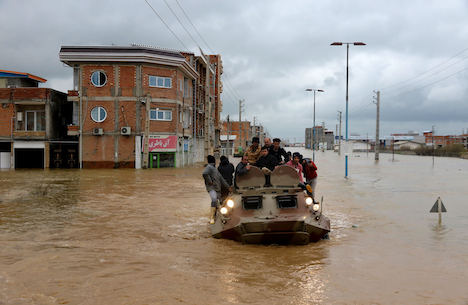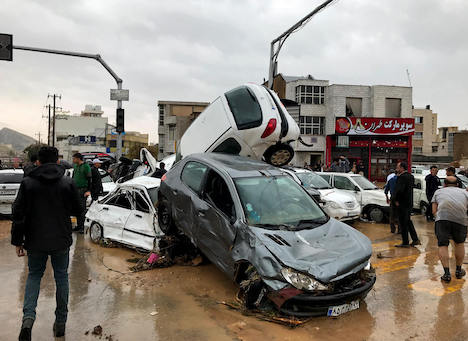Under Trump, US Pushes”Let ‘Em All Die” Policy Towards Iran Flood Victims
 Print This Print This
By Ivan Kesić
MintPress
Sunday, Apr 14, 2019
In comparison with the Trump administration, even George W. Bush and his neoconservative government seem like humanitarians.
 |
| A man watches as floodwaters hit the city of Khorramabad in the western province of Lorestan, Iran. Iran’s Foreign Minister Mohammad Javad Zarif tweeted late on Monday that U.S. sanctions imposed on Tehran by the Trump administration last year have hampered successful rescue efforts for flood-stricken areas of the country, April 1, 2019. Erfan Keshvari | ISNA via AP |
Since 19 March 19, devastating floods swept across large areas of Iran, triggered by the heaviest downpours in many years. Heavy rainfall began two and a half weeks ago, overflowing rivers, washing away bridges, inundating houses and destroying infrastructural establishments in the northern, western and central parts of the country. According to the Iran Legal Medicine Organization, at least 62 people have been killed nationwide in the natural disaster so far, which has also forced tens of thousands of people, mostly in villages, to evacuate their homes and move to emergency shelters. Hundreds of people have also been airlifted from the affected regions. The flooding caused the destruction of hundreds of millions of dollars worth of infrastructure in 24 out of Iran’s 31 provinces. At least 25,000 houses were completely destroyed, while another 60,000 sustained some form of damage.
The government of Iran declared a state of emergency in several provinces and cities, while Supreme Leader Ali Khamenei and President Hassan Rouhani have urged officials to take full advantage of all available technical capacities to save people’s lives. The Iranian Red Crescent launched widespread relief efforts nationwide, deploying 11,000 personnel to assist more than 192,000 people with life-saving care and support. Their volunteers and staff have evacuated hundreds of people to safety, and have distributed food and items such as tents, blankets and health kits. Thousands of enthusiastic Iranian citizens from all walks of life joined in a nationwide relief campaign.
The Iranian military is also at the forefront of humanitarian response efforts. Chief of Staff of the Iranian Armed Forces MG Mohammad Bagheri said after the floods that he has authorized commanders in the Islamic Revolution Guards Corps (IRGC), the Iran’s Army Ground Force, Police, and the Defense Ministry to use forces under their command to provide full and organized assistance to flood-hit areas in a coordinated manner. One hundred units of the Army were active in flooded areas. The Army scrambled a dozen military transport helicopters, as well as drones equipped with night-vision. Their units also built several temporary bridges and sent dozens of armored personnel carriers in order to speed up rescue operations in inundated areas where road vehicles cannot be used.
The IRGC deployed several helicopters, reconnaissance drones, engineering units, and field hospitals. Moreover, 1,341 groups of the IRGC’s Basij (mobilization forces) were officially active in only two northern provinces. The IRGC further announced that in the next step, it would focus on reconstruction projects. A spokesman of the Law Enforcement Police force announced that 4,000 police officers had been sent to flood-stricken areas across Iran to establish security. The Imam Khomeini Relief Foundation (IKRF) announced that its offices around the country are ready to receive the aid items and deliver them to the flooded areas.
 |
| Iranian Military vehicles rescue people after flash flooding around the northern city of Aq Qala in Golestan province, Iran, March 25, 2019. Mohsen Esmaeilzadeh | ISNA |
The Headquarters for Executing Imam Khomeini’s Order (EIKO) known as Setad, has donated thousands of blankets, tents, boots, shovels, household appliances, medicine and other relief supplies. The organization also distributed several tons of food, sent medical teams and set up mobile hospitals. It also provided boats to take part in rescuing the residents stuck on the rooftops of their houses or were stranded elsewhere in the flood. Doctors and medics also are part of this organization, which set up temporary clinics to help provide instant treatment to the injured. Market Watch reported:
Before flood hits the country, Setad has insured 140,000 rural homes in Khouzistan under the Barakat Insurance plan. The damaged homes will be repaid to rebuild their homes in the area. The Setad also provided 15,000 families with house equipment to replace what the floods had destroyed, such as fridges, washing machines, carpets, and other necessary elements. Many of these families living in rural areas raised cattle, where more than 9,000 of cattle were killed during the natural disaster. The Setad was able to replace 4,000 of these, instantly providing many of the families with their previous work so that they would not end up jobless. The officials of the organization promised that as soon as the areas are cleaned and normal life is retained after the floods, they will be able to provide some 3,000 job opportunities to the citizens of these areas.”
When it comes to foreign aid, the situation is far from being enthusiastic despite the long-standing practice of international humanitarian assistance. In similar circumstances where innocent civilians are hit by natural disasters, countries help each other irrespective of political differences, but that is not the case with the latest Iranian floods. In fact, this time, international aid is largely not even possible, all due to U.S. unilateral sanctions and their newest anti-Iran policy. One may argue that such an outcome was expected to occur, however, history teaches us that earlier bilateral relations on the issues of disasters had been completely the opposite, regardless of political tensions.
Retrospective
In the aftermath of the 9/11 attacks on the United States, Iranian Supreme Leader Ali Khamenei and President Mohamed Khatami condemned and denounced the terrorist attacks and those who carried them out. U.S. leadership reacted by declaring a war on terrorism, and Iran offered its support in very helpful ways, especially by providing significant support against the Taliban in Afghanistan. Meanwhile, huge crowds attended candlelit vigils in Iran, and 60,000 spectators observed a minute’s silence at Tehran’s stadium two days after the 9/11 attacks. Yet, Washington leaders not only failed to reward Iran’s constructive behavior but beginning in 2002, were once more beating the drums of regime change and pressing the international community to embrace their anti-Iran sanction policy. Furthermore, in accordance with his aggressive neoconservative agenda, former President George W. Bush labeled Iran as part of the Axis of Evil, outraging the Iranian leadership as well as ordinary Iranians.
Two years after the 9/11 attacks, an earthquake struck south-eastern Iran and was particularly destructive in the city of Bam, with the death toll amounting to at least 26,000 people. Despite the extremely tense relations, the U.S. offered direct humanitarian assistance to Iran and within less than a week, an emergency response team was deployed via U.S. military aircraft which consisted of search and rescue squads, aid coordinators, and medical support. The Bush administration temporarily eased restrictions on exports and private assistance to Iran, with U.S. Secretary of State Colin Powell saying that the U.S. Government must do everything it can to help those in need. “What we are doing in Iran is we are showing the Iranian people that American people care, that we have great compassion for human suffering, and I eased restrictions in order to be able to get humanitarian aid into the country,” Bush said. He also sent demagogic remarks on freedom, terrorism and nuclear weapons, but despite such politicization, the U.S. aid was nevertheless sent, along with similar assistance from 60 other countries.
Iran tried to respond with the same gesture of goodwill in the late summer of 2005 when Hurricane Katrina struck the south-eastern portion of the contiguous United States, causing severe damage and destruction in several U.S. states and killing more than one thousand people. It also badly disrupted production in the Gulf of Mexico, which supplies up to a quarter of America’s oil, thus Iran’s envoy to OPEC said his country was ready to send up to five shiploads with 20 million barrels of crude oil to the U.S. He stressed this could only happen if U.S. sanctions were lifted first, at least temporarily. Iran renewed its offer to assist the U.S. in efforts to prevent an ecological disaster caused by the spreading Deepwater Horizon oil spill in the Gulf of Mexico, following an explosion on a BP-operated oil platform in 2010. The National Iranian Drilling Company (NIDC) announced their readiness to use its decades-long expertise to fight the oil slick.
In 2012, after twin earthquakes that killed some 300 Iranians and caused widespread damage, U.S. authorities issued a temporary general license to ease transfers of aid. This time Iran rejected the U.S. offer of aid, underlining what it saw as U.S. hypocrisy given that Washington has done all it can to isolate Tehran by imposing economic sanctions, thus provoking a medicine supply crisis. Still, Iran accepted humanitarian cargo from other countries.
Block, lie, and let ’em die
Putting aside all political tensions, threats, accusations, demagoguery, and politicization, the above examples prove that the United States and Iran have helped each other or have shown willingness to help the other side. Today, it’s the very opposite situation. Not only has the United States not offered any aid to Iran, but its unilateral sanctions are preventing other countries and individuals from doing so. In addition, the U.S. highest officials are spreading fake news that Washington is seeking to help the flood-hit people, while the U.S. propaganda outlets cover the flood in Iran as a result of officials’ inefficiency. In comparison with the Trump administration, even George W. Bush and his neoconservative government seem like humanitarians.
Ali Asghar Peyvandi, the head of the Iranian Red Crescent Society, told reporters in Iran that his organization has been unable to receive international help for the victims due to U.S. banking sanctions. “We expected the Red Crescent, which is an aid organization that provides humanitarian services, to be exempted from the sanctions, but this is not the case,” Peyvandi said. Prior to the latest round of U.S. sanctions, his society had some bank accounts connected to SWIFT that were used to receive international aid but those accounts are now subject to sanctions making it impossible to transfer monetary aid to Iran or the International Red Cross Federation from other countries. The Belgium-based Society for Worldwide Interbank Financial Communications (SWIFT) financial-messaging service said last year that it was suspending access to Iranian banks. This move came after the U.S. warned that SWIFT could face sanctions if it provided services to Iranian banks blacklisted by Washington.
 |
| Vehicles are piled up on a street after a flash flood in the southern city of Shiraz, Iran, March 25, 2019. Amin Berenjkar | Mehr News Agency | AP |
The world’s largest humanitarian network has released just under 500,000 Swiss francs to bolster local Red Crescent relief efforts. Peyvandi also said that, in the aftermath of a deadly 2017 earthquake in western Iran, his organization had used the bank account of a hospital that belongs to the Red Crescent to receive aid and transfer it into the country. “We’ve written to the United Nations as well as the Red Cross about the impact of the sanctions on our ability to attract international aid, but we haven’t received any response yet,” he added. Back in October 2018, the International Court of Justice (ICJ) ordered the U.S. to halt the unilateral sanctions it had reimposed on humanitarian supplies to Iran, but Washington has refused to relieve its bans.
“Given that the accounts of the Iranian Red Crescent have been blocked, no foreign citizen or Iranian national living abroad is able to send any relief aid to flood-hit people,” Iran’s Foreign Ministry Spokesman Bahram Qassemi explained. Qassemi further said: “Usually, even in difficult and emergency conditions, not all banking systems will be blocked and the sending of humanitarian aid will be possible through bodies such as the International Committee of the Red Cross, but the US.. has blocked all aid delivery channels in an inhumane and cruel move.” The Iranian spokesperson urged the international community and international relief organizations to stand against Washington’s vicious act.
On the same topic, Iran’s Foreign Minister Mohammad Javad Zarif said that the U.S. is waging economic terrorism against Iran, and it’s indeed far from a tendentious statement. The claim of American officials that they target the Iranian government and not the people is a bad joke. To ordinary Iranians, they are targeting the people, especially the most vulnerable ones like flood victims and hospital patients. However, this is no surprise considering even more monstrous behavior such as helping Saddam carry out chemical attacks and genocide, systematic starvation of Iraqi children, destroying hospitals in Sudan, and the latest support for the Saudi-led military coalition that has inflicted profound and deadly damage on Yemen.
Particularly disgusting is the role of the U.S. and UK government-sponsored propaganda media like BBC Persian, Manoto, Radio Farda and VOA which attribute the current floods in Iran to mismanagement in urban planning and in emergency preparedness, thus trying to create a rift among the people and government officials. If we look at their articles published over the last several years or even months, we’ll see that the IRGC and Setad are some sort of “ultra-rich corporations,” while hundreds of Iranian dams built since the 1979 revolution are “mostly useless” or “completely unnecessary” because they were built in arid areas, therefore, they will “never be filled with water.” Some of them even promoted a bizarre conspiracy theory that Persians from central Iran are “stealing water” from the ethnic Arab minority.
Today, large dams in southwestern Iran are 95 percent full. In other words, they saved thousands of lives in the ethnic Arab region of Khuzestan, given that the catchment area of Karun River has been subject to devastating floods in recorded history. For example, in 1956 hundreds of people were killed and thousands of people were rendered homeless. Not only have the dam reservoirs saved lives, but they’ve prevented the possibility of drought in the foreseeable future, which means that water shortages seen in Ira last year will not be repeated. Members of the IRGC and Setad, represented in above-mentioned media as Iran’s fancy elite, can be seen today at the forefront of humanitarian rescue operations, exhausted from work and covered in mud.
The support of this organization is not only with shovels and hands. Setad Chairman, Mohammad Mokhber declared that 140,000 homes with insurance across the villages that were struck by floods will be rebuilt and owners of partially destroyed houses will receive some 35 million toumans to repair their homes. U.S. sympathy and aid are missing, claims an unnamed author from the U.S.-sponsored Radio Farda, because “Americans seem to have had enough of hate-speech and words of abuse by Iran’s Supreme Leader.” This represents a harsh and brutal distortion of the facts since it was Trump who called Iran “a terrorist nation” and adopted new anti-Iran policies which are indiscriminately targeting the entire Iranian population.
Source URL
|
 Print This Print This

|

